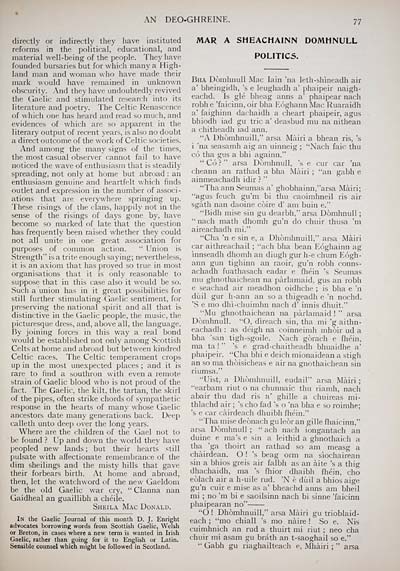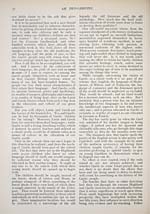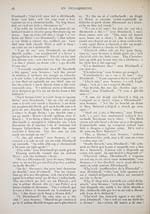Blair Collection > Deo-gréine
(99)
Download files
Complete book:
Individual page:
Thumbnail gallery: Grid view | List view

AN DEO-GHREINE.
77
directly or indirectly they have instituted
reforms in the political, educational, and
material well-being of the people. They have
founded bursaries but for which many a High-
land man and woman who have made their
mark would have remained in unknown
obscurity. And they have undoubtedly revived
the Gaelic and stimulated research into its
literature and poetry. The Celtic Renascence
of which one has heard and read so much, and
evidences of which are so apparent in the
literary output of recent years, is also no doubt
a direct outcome of the work of Celtic societies.
And among the many signs of the times,
the most casual observer cannot fail to have
noticed the wave of enthusiasm that is steadily
spreading, not only at home but abroad : an
enthusiasm genuine and heartfelt which finds
outlet and expression in the number of associ-
ations that are everywhere springing up.
These risings of the clans, happily not in the
sense of the risings of days gone by, have
become so marked of late that the question
has frequently been raised whether they could
not all unite in one great association for
purposes of common action. " Union is
Strength" is a trite enough saying; nevertheless,
it is an axiom that has proved so true in most
organisations that it is only reasonable to
suppose that in this case also it would be so.
Such a union has in it great possibilities for
still further stimulating Gaelic sentiment, for
preserving the national spirit and all that is
distinctive in the Gaelic people, the music, the
picturesque dress, and, above all, the language.
By joining forces in this way a real bond
would be established not only among Scottish
Celts at home and abroad but between kindred
Celtic races. The Celtic temperament crops
up in the most unexpected places ; and it is
rare to find a southron with even a remote
strain of Gaelic blood who is not proud of the
fact. The Gaelic, the kilt, the tartan, the skirl
of the pipes, often strike chords of sympathetic
response in the hearts of many whose Gaelic
ancestors date many generations back. Deep
calleth unto deep over the long years.
Where are the children of the Gael not to
be found ? Up and down the world they have
peopled new lands ; but their hearts still
pulsate with affectionate remembrance of the
dim sheilings and the misty hills that gave
their forbears birth. At home and abroad,
then, let the watchword of the new Gaeldom
be the old Gaelic war cry, " Clanna nan
Gaidheal an guaillibh a chèile.
Sheila Mac Donald.
MAR A SHEACHAINN DOMHNULL
POLITICS.
In the Gaelic Journal of this month D. J. Enright
advocates borrowing words from Scottish Gaelic, Welsh
or Breton, in cases where a new term is wanted in Irish
Gaelic, rather than going for it to English or Latin.
Sensible counsel which might be followed in Scotland.
Bha Dòmhnull Mac Iain 'na leth-shineadh air
a' bheingidh, 's e leughadh a' phaipeir naigh-
eachd. Is glè bheag anns a' phaipear nach
robh e 'faicinn, oir bha Eòghann Mac Ruaraidh
a' faighinn dachaidh a cheart phaipeir, agus
bhiodh iad gu trie a' deasbud mu na nithean
a chitheadh iad ann.
"A Dhòmhnuill," arsa Màiri a bhean ris, 's
i na seasamh aig an uinneig ; "Nach faic thu
co tha gus a bhi againn."
" Co ? " arsa Dòmhnull, 's e cur car 'na
cheann an rathad a bha Màiri ; "an gabh e
ainmeachadh idir ? "
"Tha ann Seumas a' ghobhainn,"arsa Màiri;
"agus feuch gu'm bi thu caoimhneil ris air
sgàth nan daoine còire d' am buin e."
"Bidh mise sin gu dearbh," arsa Dòmhnull ;
"nach math dhomh gun do chuir thusa 'm
aireachadh mi."
"Cha 'n e sin e, a Dhòmhnuill," arsa Màiri
car aithreachail ; "ach bha bean Eòghainn ag
innseadh dhomh an diugh gur h-e chum Eogh-
ann gun tighinn an raoir, gu'n robh conns-
achadh fuathasach eadar e fhèin 's Seumas
mu ghnothaichean na pàrlamaid, gus an robh
e seachad air meadhon oidhche ; is bha e 'n
dùil gur h-ann an so a thigeadh e 'n nochd.
'S e mo dhi-chuimhn nach d' innis dhuit."
"Mu ghnothaichean na pàrlamaid ! " arsa
Dòmhnull. "O, direach sin, tha mi 'g aithn-
eachadh : as dèigh na coinneimh mhòir ud a
bha 'san tigh-sgoile. Nach gòrach e fhèin,
ma to!" 's e grad-chaitheadh bhuaidhe a'
phaipeir. "Cha bhi e deich mionaidean a stigh
an so ma thòisicheas e air na gnothaichean sin
riumsa."
"Uist, a Dhòmhnuill, eudail" arsa Màiri ;
"earbam riut o na chunnaic thu riamh, nach
abair thu dad ris a' ghille a chuireas mi-
thlachd air ; 's cho fad 's o na bha e so roimhe;
's e car càirdeach dhuibh fhein."
"Thamisedeònachguleòran gille fhaicinn,"
arsa Dòmhnull ; " ach nach iongantach an
duine e ma's e sin a leithid a ghnothaich a
tha 'ga thoirt an rathad so am measg a
chàirdean. O ! 's beag orm na siochairean
sin a bhios greis air falbh as an àite 's a thig
dhachaidh, ma 's fhior dhaibh fhèin, cho
eòlach air a h-uile rud. 'N è dùil a bhios aige
gu'n cuir e mise as a' bheachd anns am bheil
mi ; no 'm bi e saoilsinn nach bi sinne 'faicinn
phaipearan no"
"O ! Dhòmhnuill," arsa Màiri gu trioblaid-
each ; "mo chiall 's mo nàire ! So e. Nis
cuimhnich an rud a thuirt mi riut ; neo cha
chuir mi asam gu bràth an t-saoghail so e."
" Gabh gu riaghailteach e, Mhàiri ; " arsa
77
directly or indirectly they have instituted
reforms in the political, educational, and
material well-being of the people. They have
founded bursaries but for which many a High-
land man and woman who have made their
mark would have remained in unknown
obscurity. And they have undoubtedly revived
the Gaelic and stimulated research into its
literature and poetry. The Celtic Renascence
of which one has heard and read so much, and
evidences of which are so apparent in the
literary output of recent years, is also no doubt
a direct outcome of the work of Celtic societies.
And among the many signs of the times,
the most casual observer cannot fail to have
noticed the wave of enthusiasm that is steadily
spreading, not only at home but abroad : an
enthusiasm genuine and heartfelt which finds
outlet and expression in the number of associ-
ations that are everywhere springing up.
These risings of the clans, happily not in the
sense of the risings of days gone by, have
become so marked of late that the question
has frequently been raised whether they could
not all unite in one great association for
purposes of common action. " Union is
Strength" is a trite enough saying; nevertheless,
it is an axiom that has proved so true in most
organisations that it is only reasonable to
suppose that in this case also it would be so.
Such a union has in it great possibilities for
still further stimulating Gaelic sentiment, for
preserving the national spirit and all that is
distinctive in the Gaelic people, the music, the
picturesque dress, and, above all, the language.
By joining forces in this way a real bond
would be established not only among Scottish
Celts at home and abroad but between kindred
Celtic races. The Celtic temperament crops
up in the most unexpected places ; and it is
rare to find a southron with even a remote
strain of Gaelic blood who is not proud of the
fact. The Gaelic, the kilt, the tartan, the skirl
of the pipes, often strike chords of sympathetic
response in the hearts of many whose Gaelic
ancestors date many generations back. Deep
calleth unto deep over the long years.
Where are the children of the Gael not to
be found ? Up and down the world they have
peopled new lands ; but their hearts still
pulsate with affectionate remembrance of the
dim sheilings and the misty hills that gave
their forbears birth. At home and abroad,
then, let the watchword of the new Gaeldom
be the old Gaelic war cry, " Clanna nan
Gaidheal an guaillibh a chèile.
Sheila Mac Donald.
MAR A SHEACHAINN DOMHNULL
POLITICS.
In the Gaelic Journal of this month D. J. Enright
advocates borrowing words from Scottish Gaelic, Welsh
or Breton, in cases where a new term is wanted in Irish
Gaelic, rather than going for it to English or Latin.
Sensible counsel which might be followed in Scotland.
Bha Dòmhnull Mac Iain 'na leth-shineadh air
a' bheingidh, 's e leughadh a' phaipeir naigh-
eachd. Is glè bheag anns a' phaipear nach
robh e 'faicinn, oir bha Eòghann Mac Ruaraidh
a' faighinn dachaidh a cheart phaipeir, agus
bhiodh iad gu trie a' deasbud mu na nithean
a chitheadh iad ann.
"A Dhòmhnuill," arsa Màiri a bhean ris, 's
i na seasamh aig an uinneig ; "Nach faic thu
co tha gus a bhi againn."
" Co ? " arsa Dòmhnull, 's e cur car 'na
cheann an rathad a bha Màiri ; "an gabh e
ainmeachadh idir ? "
"Tha ann Seumas a' ghobhainn,"arsa Màiri;
"agus feuch gu'm bi thu caoimhneil ris air
sgàth nan daoine còire d' am buin e."
"Bidh mise sin gu dearbh," arsa Dòmhnull ;
"nach math dhomh gun do chuir thusa 'm
aireachadh mi."
"Cha 'n e sin e, a Dhòmhnuill," arsa Màiri
car aithreachail ; "ach bha bean Eòghainn ag
innseadh dhomh an diugh gur h-e chum Eogh-
ann gun tighinn an raoir, gu'n robh conns-
achadh fuathasach eadar e fhèin 's Seumas
mu ghnothaichean na pàrlamaid, gus an robh
e seachad air meadhon oidhche ; is bha e 'n
dùil gur h-ann an so a thigeadh e 'n nochd.
'S e mo dhi-chuimhn nach d' innis dhuit."
"Mu ghnothaichean na pàrlamaid ! " arsa
Dòmhnull. "O, direach sin, tha mi 'g aithn-
eachadh : as dèigh na coinneimh mhòir ud a
bha 'san tigh-sgoile. Nach gòrach e fhèin,
ma to!" 's e grad-chaitheadh bhuaidhe a'
phaipeir. "Cha bhi e deich mionaidean a stigh
an so ma thòisicheas e air na gnothaichean sin
riumsa."
"Uist, a Dhòmhnuill, eudail" arsa Màiri ;
"earbam riut o na chunnaic thu riamh, nach
abair thu dad ris a' ghille a chuireas mi-
thlachd air ; 's cho fad 's o na bha e so roimhe;
's e car càirdeach dhuibh fhein."
"Thamisedeònachguleòran gille fhaicinn,"
arsa Dòmhnull ; " ach nach iongantach an
duine e ma's e sin a leithid a ghnothaich a
tha 'ga thoirt an rathad so am measg a
chàirdean. O ! 's beag orm na siochairean
sin a bhios greis air falbh as an àite 's a thig
dhachaidh, ma 's fhior dhaibh fhèin, cho
eòlach air a h-uile rud. 'N è dùil a bhios aige
gu'n cuir e mise as a' bheachd anns am bheil
mi ; no 'm bi e saoilsinn nach bi sinne 'faicinn
phaipearan no"
"O ! Dhòmhnuill," arsa Màiri gu trioblaid-
each ; "mo chiall 's mo nàire ! So e. Nis
cuimhnich an rud a thuirt mi riut ; neo cha
chuir mi asam gu bràth an t-saoghail so e."
" Gabh gu riaghailteach e, Mhàiri ; " arsa
Set display mode to: Large image | Transcription
Images and transcriptions on this page, including medium image downloads, may be used under the Creative Commons Attribution 4.0 International Licence unless otherwise stated. ![]()
| Early Gaelic Book Collections > Blair Collection > Deo-gréine > (99) |
|---|
| Permanent URL | https://digital.nls.uk/76698782 |
|---|
| Description | A selection of books from a collection of more than 500 titles, mostly on religious and literary topics. Also includes some material dealing with other Celtic languages and societies. Collection created towards the end of the 19th century by Lady Evelyn Stewart Murray. |
|---|
| Description | Selected items from five 'Special and Named Printed Collections'. Includes books in Gaelic and other Celtic languages, works about the Gaels, their languages, literature, culture and history. |
|---|

